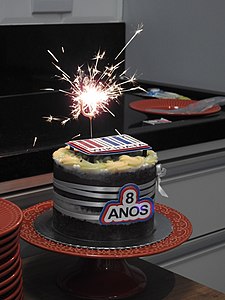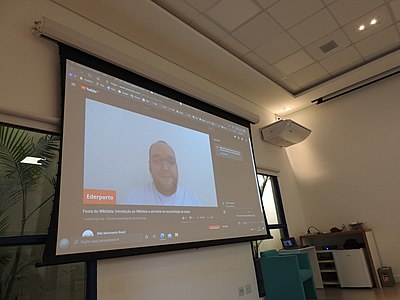GLAM/Newsletter/October 2020/Contents/Brazil report
|
Abre-te Código hackathon, Wikidata related events and news from our partners
Wikidata birthday celebrations
Wikidata Lab XV
The 25th Wikidata Lab were taught in partnership with Tainacan, a flexible and powerful collection management plugin for Wordpress developed for providing an easy and professional repository platform for cultural institutions and more. The theme was interoperability and data access and the presentation is available here. For the practical activity, Wikimedians worked on Tainacan platform and the Taincan team worked on Wikidata. You'll hear more about this partnership soon!
Wikidata Party
On October 24th, WMB hosted a Wikidata Party (Festa do Wikidata, in Portuguese), a hybrid event: online and in person. It was the first time since early March that the professional team from WMB gathered in person. Due COVID-19 preventive measures, we had only 7 people attending the event, hosted at one of the only certified spaces in São Paulo for holding corporate events. It was very emotional! Around other 20 people from the Lusophone community attended the event thorugh its online interface.
The program included 3 live presentations via YouTube and one hands-on activity of improving a Museu Paulista collection dataset. The first presentation was an introduction to Wikidata, addressing a Lusophone community request, followed by a special presentation for the Abre-te Código hackathon (see below) participants on Wikidata for cultural institutions and GLAM partnerships. To wrap the day, we delivered Wikidata presents on a live sharing how we contributed to Wikidata in 2020. Oh, and we had an amazing chocolate cake!
Updates on Abre-te Código hackathon

Abre-te Código is the Global South edition of the Coding da Vinci hackathon, being held simoutaneously in Brazil, South Africa and Indonesia. The idea is to gather cultural institutions around open data culture and provide space for creativity and innovation with their datasets. Wiki Movimento Brasil have been involved in the Brazilian hackathon since the begining and after several months of formative content creation, October carried the actual development of the prototypes. After 3 days of intense online mentoring and brainstorming, the participanting teams delivered 15 viable projects to be further developed throughout November. In December, the jury will announce the winning teams, to be awarded with grants and trips to Germany!
WikiCite Conference
Érica Azzellini and Célio Costa, members of the Wiki Movimento Brasil UG, organized two sessions at the WikiCite Virtual Conference. They were awarded an e-scholarship and delivered sessions focused on bringing Global South voices under the scope of structuring projects on Wikidata, bibliography and library data.
The first session called Global annotation of the scientific literature on viral epidemics using Wikidata gathered the team from OpenVirus project, mainly based in India. We also had the participation of the Redalyc and Open Access, representing Latin America, and INA-rxiv project, from Indonesia.
There were 13 speakers from at least 3 different timezones. The presentations occurried mainly in English, but also in a bit of Hindi and Spanish. The session approached Scholia interfaces, technical demonstrations and different practical discussions on access to academic publications and the exclusion of voices from the Global South.
The second session revolved around structuring projects on Wikidata, with presentations about libraries GLAM and queries, the Wikidata WikiProject COVID-19 and the Mbabel tool for Brazilian elections. There were three presentations in Portuguese and one in Spanish.
Both video sessions are available now on Wikimedia Commons! It is also on YouTube - both on Wikipedia Weekly and Wiki Movimento Brasil channels.
A special thanks goes to Liam Wyatt for supporting this endeavor since the begginning!
Wiki Loves Monuments

We're proud to share with the community that Wiki Loves Monuments Brasil reached the 5th position at the general WLM campaign this year! We received over the month of October more than 15 thousand images depicting 802 monuments - from which 417 were depicted for the first time on Wikimedia Commons. There were 135 participants throughout the contest - 86 of them participating for the first time. The images count up to 50 thousand views already!
We'll announce the national winners by the end of November.
Paulista Museum GLAM
During the month of October, WMB members also uploaded more than 100 thousand pieces of metadata on Wikidata, enhancing a previous batch made available on the platform: a collection from Museu Paulista with works by the photographer Militão Augusto de Azevedo.
The purpose of this upload was to improve the depicts property (P180) of more than 12 thousand items by the photographer, including photographs and postcards. This activity was part of the GLAM partnership with the Paulista Museum and was important to improve the gamified application What clothes should I wear?, also created by WMB members, and that improves the information on clothes and garments of people portrayed in the works from this museum.
University of São Paulo Libraries GLAM
We're also happy to inform that the first upload by the GLAM from the University of São Paulo Libraries also took place at the beginning of November. The items about 337 professors from the School of Communications and Art at the University of São Paulo (ECA-USP) were made available, in three different batches (first, second, third), with all metadata collected and made available on Wikidata in the most complete way possible.
The metadata was provided by the Biblioteca da ECA and the intention is to use the items to structure the works of the institution's own collection that will be made available on Commons and on Wikidata soon.
NeuroMat GLAM portal

Also during October, WMB members finally created a portal for a long time GLAM partnership held with RIDC NeuroMat (Research, Innovation and Dissemination Center for Neuromathematics). The project by this research center was the largest producer of mathematical content on Wikipedia, in addition to supporting several other Wiki partnerships, GLAM projects, events, edit-a-thons, technical training (such as Wikidata Labs), and even hosting several Wikimedians-in-Residence.
The portal will not only be a space to gather all the Wiki activities developed and supported by NeuroMat in recent years in one spot but also intends to be a space for action and adhesion of possible volunteers interested in contributing to the activities carried out. There, users can now find all the material made available, including images, videos, GIFs, events, audio files, courses, tools, queries, and much more!
Sociedade Brasileira para o Progresso da Ciência
As we announced in the July's Newsletter, Wiki Movimento Brasil is partnering with Sociedade Brasileira para o Progresso da Ciência (SBPC), an organization that cares about the development of the scientific, technological, educational and cultural environment in Brazil.
At first, the partnership will include an edit-at-thon aimed at members of Brazilian scientific societies. However, the purpose of the event will not be to edit entries themselves but to form lists that will help to solve content gap problems found on Wikipedia in Portuguese, especially in scientific subjects, related to the different work areas of the participants.
After this first event, the goal is not only to organize more edit-at-thons but possible also to carry out a GLAM-Wiki project with the organization. SBPC has in its archive an important collection of Brazilian scientific knowledge.
Creative Commons Virtual Summit
During October, Wiki Movimento Brasil also participated in the Creative Commons Virtual Global Summit 2020. Two members of the group presented in the OpenGLAM track.
João Alexandre Peschanski carried out a short presentation during the CC Open GLAM Platform Meeting about Wiki Loves Bahia, a project to diversify content in the Open Knowledge Brazilian Ecosystem.
On October 22, Giovanna Fontenelle presented the case of the Brazilian OpenGLAMs partnerships on Wikipedia. The page for the lecture is available here.
The videos for the presentations will be available on the Creative Commons YouTube channel soon!






